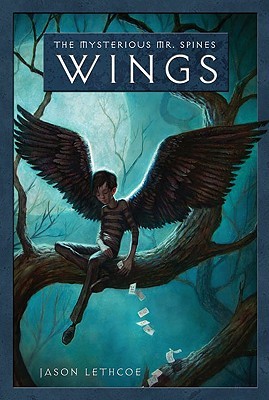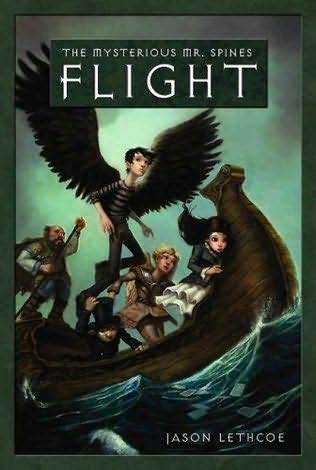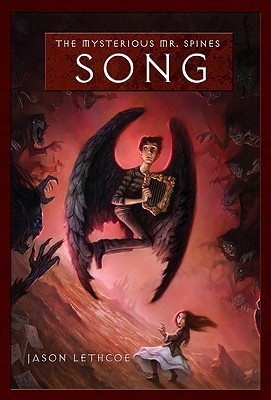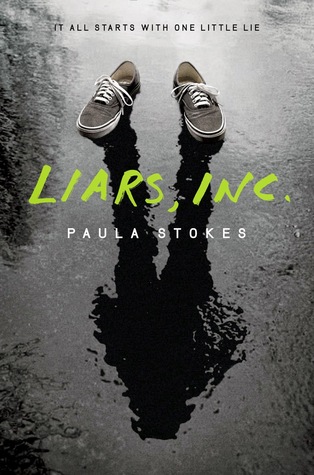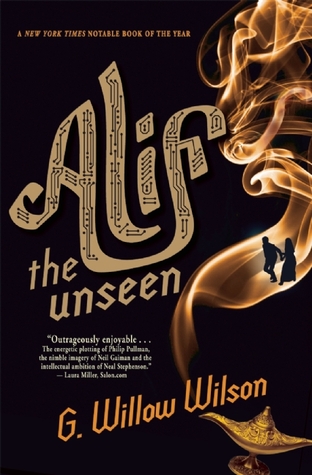I kept waiting. Eventually I had to breathe, but my metaphorical breath was still pent up.
I waited years.
It was a traumatic experience. I wasn't into Firefly soon enough to feel the sting of betrayal and unjust cancellation, but I can sympathize, because a series is sort of like a TV show, and my series was cruelly cut off.
This isn't about Benjamin Piff, but it is about Lethcoe. I finally let Lethcoe back into my life after he hurt me (probably unintentionally, I don't blame him). This time it was the mercifully completed series, The Mysterious Mr. Spines.
The Mysterious Mr. Spine's first book, Wings (not to be confused with Aprilynne Pike's awful anorexic plant-fairy story), was pretty similar to Benjamin Piff, to be honest: Edward McLeod is orphaned when his mother dies, and he's in a horrid orphanage, though this is in the 20s. There's an itch between his shoulders that he can't scratch. Meanwhile, a handful of magical people are searching for him - some who are benevolent, like Mr. Spines, a strange little spiked man, and some who aren't so benevolent, like Scruggs, a demonic whip-wielding "man." In the course of the very short book, Edward discovers the hard way that the itch in his shoulders is where his wings are growing.
I'll be frank - it's not the best writing on earth. (It's not as good as Benjamin Piff - but then, I'm biased.) The concept is not totally original but still untrod enough to be interesting: Mr. Spines and his apprentices are Guardians who "fell" from the "Higher Places." Yes, it's basically about Milton's angels and Dante's levels of heaven. The original faller was the Jackal, who busted up the bridges to the seven heavenly levels as he fell, and now the Guardians are awaiting the prophesied Builder, to fix the bridges and let them back up into the worlds.
Not much of this happens in Wings. It's mostly leadup into the next book - it deals with Edward growing his wings, meeting the Guardians, and finding out about the conflict between the Groundlings (fallen, corrupted Guardians) and the good guys. Also about Edward's mother, who was a glorious warrior against the Jackal before she died, and some unsubtle hinting about her relationship with Mr. Spines. Mostly, Edward runs and freaks out about the guys chasing him.
The highlight of the book is at the end, in the Woodbine (first level of Heaven), where all the dead mortals are stuck with the bridges broken. Edward ends up there and is rescued by Jack the Faun and a little man with big hairy feet called Tollers. LETHCOE, I SEE WHAT YOU DID THERE.
Flight picks up about where Wings left off. Edward is in the Woodbine with his allies, trying to figure out what to do next.
Honestly, I expected more. These books are too short for anything nonessential to happen, but it feels like 80% of the book is filled with nonessentials. There's a lot of talk about the Bridges and the Jackal and the Builder, and getting Edward's mother back, but there's not a lot of doing about those things. Like Wings, a lot of it is taken up with running away from the bad guys, and Edward Eragoning it up when he miraculously uses a Word of Power he discovered through - luck? - that's too powerful for his strength.
This is, of course, the book where the familial relationships are cleared up. For some reason, there's not a lot of emotional fallout. There is a pretty sad moment when Edward loses a dear possession, but it's not... heartbreaking. Like I said, the book is just too short and shallow to really dive into the implications. I get that it's a middle-grade book, but I've read plenty of middle-grade books that really punched me in the gut. I don't get that from Flight.
But for those of you who were skeptical about coincidences surrounding the names and species of Jack the Faun and Tollers, the "supplemental materials" at the end of this book is a treatise on Mr. Spine's fall from the Higher Places, written by Jack the Faun. His full name? Jack C. Staples. YEAH YEAH YEAH.
Song finishes the story with a resounding... deus ex machina.
At least in the third and final book, we get a little action towards fulfilling the goals that have been in place since Chapter 2 or 3 of the first book. There's the assault on the Jackal's fortress with some questionable choice of companionship, and there are, to be fair, some pretty good scenes between Edward and Lucy, Jack the Faun's niece. Their little thing is pretty cute.
Edward's relationship with Mr. Spines is underwhelming. At first, Edward harbors some understandable resentment towards Mr. Spines, and it makes some amount of sense; it's not the best-written resentment, but it's still good. Then he does a 180, and his opinion of Mr. Spines just... miraculously clears. The end of the story would have been more poignant if the emotions had been more complex - and again, middle-grade fiction is not exempt from emotional complexity!
It ends with one of the most egregious uses of deus ex machina that I've ever read, which is sad because there was plenty of room to build up to this ending - so many ways to fix it so it would have felt organic, and not just an easy out. It made me sad. Lethcoe can do better than this.
It's a very short series - I probably read each one in about an hour or so - and if you have to choose between The Mysterious Mr. Spines and, say, Fallen, please go for Mr. Spines. At least there's Jack the Faun to chuckle over, and the Guardian world is really pretty interesting. (Not to mention Tabitha, a young Guardian who sort of reminds me visually of Pearl from Steven Universe, if Pearl had wings.) Lethcoe writes amusing supplemental material.
I don't know. I'm sorry, Lethcoe; it's not you, it's me.
